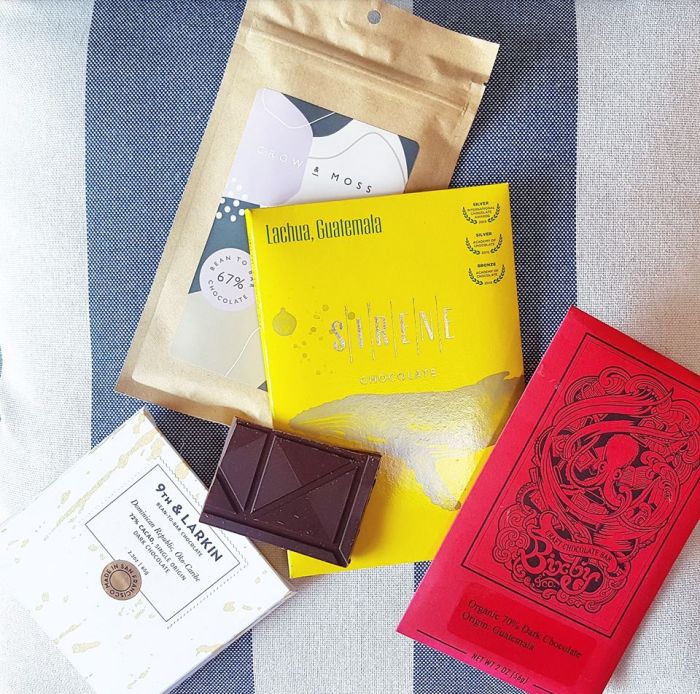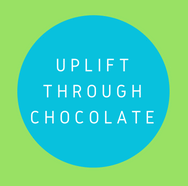Hello!
**Update: three wonderful craft chocolate bars made with Caribbean cacao, by 9th & Larkin Chocolate, Crow & Moss Chocolate, and Sirene Chocolate, are in the April 2020 issue of Luckbox Magazine in a clever piece on rum, chocolate, and cigar combinations, along with chocolate tasting notes by yours truly; click for the digital edition and see pp. 36 – 38! Thank you LuckboxMag and TastyTrade! **

What do these chocolate bars have in common?
Yes, they all meet my 5 Ss of first-class craft chocolate in that they are:
- slavery-free
- soy-free and additive-free
- sustainable
- small-batch and
- scrumptious!
In addition, they are all made from cacao grown in the Caribbean!
When you think of food and drink of the Caribbean, maybe you think of excellent rum, cane sugar, jerk chicken. Cacao and chocolate also have important and delicious roots in Caribbean soil.


The Caribbean islands became a major part of the cacao industry in the 1500s, after European colonizers brought cacao from native lands in South America to the islands for cultivation and export to Europe. Spain controlled most of the trans-Atlantic cacao trade from South America, so by growing cacao in the Caribbean, the English — and Dutch pirates — were able to compete. Slave labor was often used, and when slavery was abolished in Puerto Rico in 1873, profits went down, and commercial cacao-growing in the Caribbean became less important to Europe, especially as West African farms were being exploited and people there were finding themselves slave laborers.
Today, 2.1 million children work on cacao farms in Cote d’Ivoire, most in slavery or hazardous conditions, generally without schooling and often away from their family homes, so that we can have cheap chocolate in the west. The big brands are complicit, as articles and more articles reveal.
Good news: the rise of artisanal bean-to-bar chocolate made from ethical, traceable, single-origin cacao, provides a new opportunity for growing cacao in the Caribbean, in a way that supports people and planet.

For example, Reserva Zorzal in the Dominican Republic is a sustainable cacao farm plus bird sanctuary, where plants and animals live in a mutually beneficial ecosystem. The cacao is grown for quality, not quantity, and you can taste this in a chocolate bar like the one made by Crow & Moss Chocolate of Northern Michigan. The chocolate bar contains just 2 ingredients: cacao and sugar — all you need to make chocolate! My tasting notes:
Deep notes of cherry, caramel, and cinnamon, opening into earthy fudginess, and coming up to conclude on a lightly grape-meets-fennel finish. Long finish. Some complexity, yet relatively straightforward, with clarity, without muddiness. True to the bean. No bitterness. Ultimately interesting, balanced, accessible.
Those flavors are all from the cacao, and from how Mike Davies, founder of Crow & Moss and a professional baker and hobby farmer, roasts and grinds the cacao into chocolate in his 2,000 square foot manufactory.



Tasting the Caribbean through chocolate is exciting, and let me know if you’d like to travel with me to the source, as I am talking with Zorzal founder Chuck Kerchner, a PhD in forestry, about special upscale agri-tours to his cacao estate in the Dominican Republic.

In the meantime, you can find selections of the four brands featured here at stores like these:
9th & Larkin — The Grail Cafe, Totto’s Market
Bixby Chocolate — Beacon Hill Chocolates, Honeycreeper Chocolate, Rare Bird Preserves, Spilt Milk Pastry, Yahara Chocolate
Crow & Moss Chocolate — The Grail Cafe, Totto’s Market
Sirene Chocolate — Brew Brew Coffee and Tea, Cocoa + Co., Honeycreeper Chocolate, Totto’s Market, Yahara Chocolate
Keep eating craft chocolate — onward and upward!
Your friend in chocolate,
Valerie

Valerie Beck
Founder/CEO Chocolate Uplift
Craft Chocolate Brokering, Consulting, Distribution
http://www.chocolateuplift.com
chocolateuplift@gmail.com
Insta: @chocolateuplift












